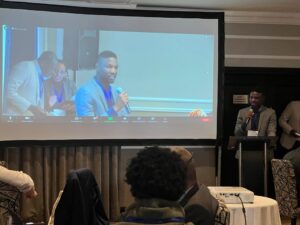Spaces for Change | S4C joined 35 other participants from 18 African countries at the regional workshop on “Best Practices in Countering Money Laundering and Terrorism Financing While Preserving Civic Space” held in Cape Town, South Africa, from May 22 to 24, 2023. The participants drawn from West, East, and Southern Africa came together to share perspectives on how to improve the application of the Financial Action Task Force’s (FATF’s) Recommendation 8 (R8) in their respective countries. The 3-day event is the third in a series of regional consultations organized by the European Union Global Facility on Anti-Money Laundering/Countering the Financing of Terrorism in partnership with the Global NPO Coalition on FATF, International Centre for Non-Profit Law (ICNL) and the various FATF-styled regional bodies.
R8 is one of FATF 40+9 Standards focusing on the operations of non-profit organizations (NPOs). The initial language of R8 in 2012 described NPOs as particularly possessing characteristics that make them susceptible to misuse for terrorist financing. This language was revised in 2016 and now requires governments to employ “focused and proportionate measures, in line with the risk-based approach” toward the subsets of NPOs identified to be vulnerable to terrorist financing (TF) abuse. This revision came at a time national regulations and measures embodying the sentiments of the initial language had already been enacted and crystalized into hard law. This incorrect application of RB in many jurisdictions occasioned a tidal wave of unintended consequences, including blanket restrictions that disrupted legitimate charitable activities.
During the panel meetings, roundtable discussions, and plenary discussions over the three days, S4C and other participants shared experiences regarding the application of R8 in eastern, western, and southern Africa, highlighting the opportunities and common challenges to civil society. One common finding emerging from the various perspectives is that the failure to correctly apply R8 can produce serious consequences such as financial exclusion, blanket restrictions, and over-regulation while severely undermining the freedom of association and assembly. Not only that, the majority of African countries have not yet conducted a participatory risk assessment of the non-profit sector but have gone ahead to enact legislations and measures to regulate the governance, finances, and operations of NPOs. This means that without a proper risk assessment, laws enacted to counter TF abuse in the non-profit sector have been applied uniformly to the entire universe of NPOs irrespective of their risk spectrums, leading to restrictive regulatory environments, onerous reporting obligations and overregulation, all of which combine to stifle the spaces for civic participation.
Other challenges include limited opportunities for NPOs to meaningfully engage or participate in anti-money laundering and countering terrorism financing discourse with national authorities. These issues are often classified and therefore not subjected to public scrutiny. Other limitations include a lack of trust, fear of reprisal attacks, and the technicalities associated with FATF advocacy. Despite these challenges, there have been opportunities for transformative action. FATF Standards have had a positive impact on the legal environment for non-profits operating in the African region. Mutual evaluation ratings have become viable tools for eliciting compliance with FATF Standards. Legislations have been revised to remove stringent reporting obligations imposed on non-profits. Risk assessments have been conducted in some countries while targeted supervision of NPOs identified to be at risk has been enforced. Nigeria’s repeal of its money laundering and terrorism prevention legislations in 2022 coupled with the delisting of non-profits from its list of designated non-financial institutions is an example of the progress flowing from the correct application of the risk-based approach.
Beyond the learning exchanges, participants also fostered better connections while encouraging problem-solving and constructive dialogues across countries. Some problem-solving approaches considered include self-regulation, shadow-reporting, and capacity-building. Findings and recommendations from this meeting will feed into the ongoing review of the FATF Best Practice Paper on Recommendation 8 expected in October 2023.





















